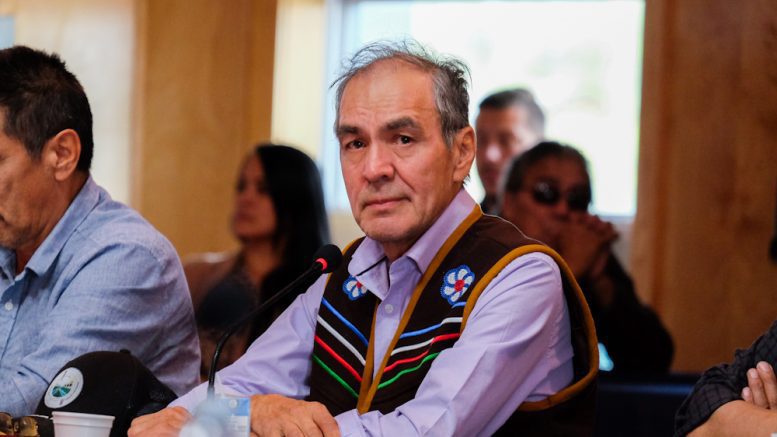Dene National Chief Norman Yakeleya says when he left residential school, he felt like the Catholic church had “got away” with its mistreatment of Indigenous children.
Today, he says, survivors have “our truth and our faith.”
Now, part of that truth is the opportunity to meet with Pope Francis and request a formal apology for the Catholic church’s role in the Residential School System.
In June, the Canadian Conference of Catholic Bishops (CCCB) announced it would support a delegation of Indigenous leaders to meet with Pope Francis in December.
Three groups of delegates representing First Nations, Métis and Inuit will meet with the Pope between Dec. 17 and 20.
Yakeleya is the Assembly of First Nations (AFN) member in charge of the residential school portfolio and will be part of the delegation.
Yakeleya says AFN has been working to get an apology from the Pope since the Truth and Reconciliation Commission released its Calls to Action in 2015.
In addition to the request for an apology, the delegation will also ask that Pope Francis deliver the message in Canada.
The location has not yet been determined, but Yakeleya mentioned the sites of former residential schools such as Kamloops, B.C. and Cowessess, Sask.
Following the announcement in June, Perry Bellegarde, AFN’s chief at the time, said there was no guarantee of an apology but that Indigenous leaders still had to try.
“Never have I ever thought that we would come this far,” says Yakeleya.
A forgiving nation
Yakeleya says he’s been speaking with Dene Nation’s Elders Council to come up with a message to deliver to the Pope.
That message needs to include forgiveness, says Yakeleya.
He added that asking survivors to forgive the church is to ask them to “forgive the unforgivable.”
However, he heard from Elders that it was important to forgive.
“As the Dene, we are a forgiving nation,” Yakeleya says.
He added that going directly to the Pope is a “chance of a lifetime
‘Questionable’ apology from Canadian bishops
In late September, the CCCB issued its own apology for residential schools.
There has been a range of reactions to the apology.
Frank T’Seleie, an Elder, former chief and leader from Fort Good Hope, said the apology is a step in the right direction, but he understands leadership wants an apology from the Pope.
Rick Hardy, a Métis residential school survivor from Tulita, says he doesn’t accept the apology, calling it a non-apology.
April Martel, the chief of K’atl’odeeche First Nation, didn’t want to comment on the apology specifically but said actions speak louder than words, specifically referencing the federal and territorial government.
Yakeleya called the apology “questionable” especially around the financial commitments the CCCB put forward: $30 million over five years for healing initiatives.
The church has broken similar commitments before.
“We know from past experiences that we cannot let go so fast,” says Yakeleya.
Yakeleya likened the importance of an apology directly from the Pope to demanding it from the prime minister.
“He is the top man,” he says.
Yakeleya wants to see a relationship between the church and Indigenous people based on mutual respect and recognition.
“Now the Roman Catholic Church has to listen to the Indigenous people and understand our worldview, our way of looking at life, and how we like to practice our spirituality.”
With files from Luke Carroll.





